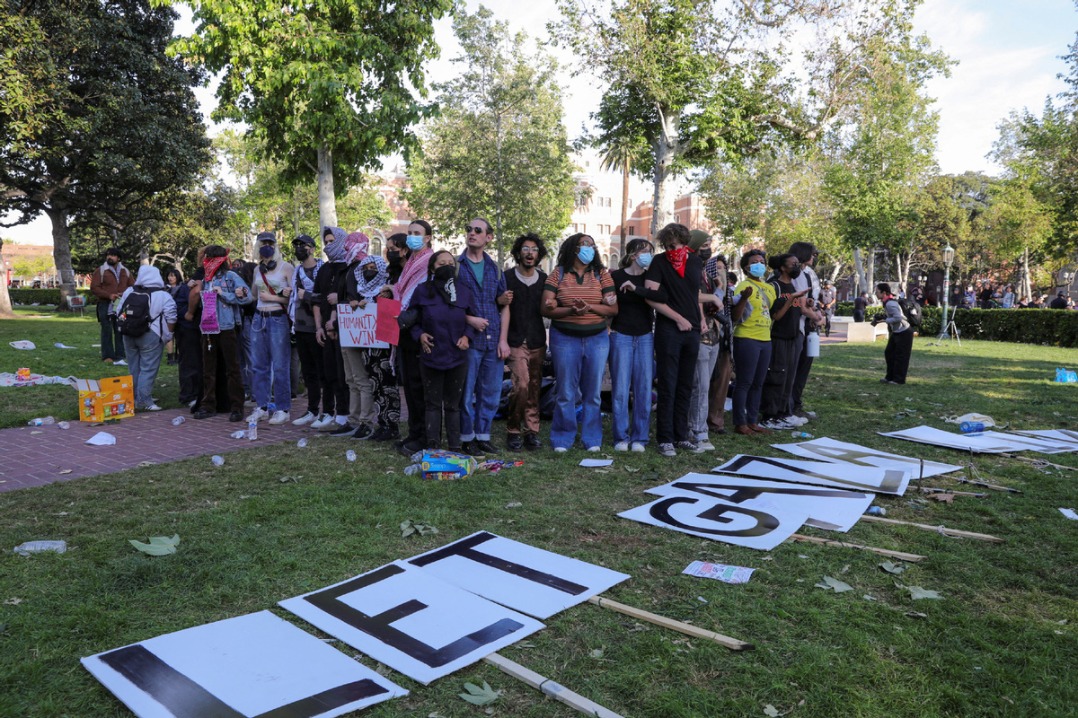Biden heads to Asia for talks in Seoul, Tokyo
By ZHAO RUINAN | China Daily | Updated: 2022-05-20 10:30

US leader's agenda risks stirring up uncertainties in region, experts say
US President Joe Biden was to embark on his first trip to Asia on Friday since taking office, in an attempt to cement ties with allies while containing China, a move experts say could further destabilize the region and stir up fresh geopolitical confrontations.
Biden was scheduled to arrive in Seoul on Friday to start a three-day visit that will include his first summit with Republic of Korea President Yoon Suk-yeol on Saturday. Yoon took office on May 10.
The United States president will meet with Japanese Prime Minister Fumio Kishida on Monday, their first in-person bilateral talks, before attending a summit of Quad-an alliance comprising Australia, Japan, India and the US-on Tuesday.
Biden's visit to the ROK comes amid rising tensions on the Korean Peninsula following Pyongyang's recent missile launches and the ongoing Russia-Ukraine conflict.
Zhan Debin, a professor of international relations at Shanghai University of International Business and Economics, said Biden's unusual move of choosing Seoul as his first stop in Asia shows his main focus for the planned meeting: economic security and supply chains.
"For Washington, Seoul may play a great role in this perspective. So, Biden chose to meet with the new ROK president first, along with a visit to Samsung's chip factory. He wants to rope in the ROK to move in lockstep with the US to curb China," Zhan said, adding that the Biden administration also has concerns on the Democratic People's Republic of Korea issue.
US National Security Adviser Jake Sullivan said on Wednesday that Biden and Yoon will "consult on the challenge posed by the DPRK".
On Thursday, Seoul said it had decided to join the US-led Indo-Pacific Economic Framework, or IPEF, widely seen as a coalition aimed at excluding China from global supply chains.
Yoon's office said he will attend virtually a summit in Tokyo where Biden is poised to formally launch the framework next week.
Li Nan, a researcher at the Institute of American Studies, Chinese Academy of Social Sciences, said Saturday's meeting could set the tone for the future trajectory of the US-ROK alliance, as Seoul's entry into the US-proposed economic framework signals its tilt even closer to Washington.
Greater influence sought
"The US is seeking greater influence in the Asia-Pacific region by launching the IPEF, which is also an important part of its so-called Indo-Pacific strategy. Its purpose, apparently, is to counter a rising China," said Li, adding that the framework would add more uncertainty to the region's economic integration because it will allow political factors to hamper trade activities.
Nam Chang-hee, a professor of political science at Inha University, was quoted by Yonhap News Agency as saying, "The Yoon administration may show more clarity on its foreign policy strategy to differentiate itself from the preceding administration, but it will still explore ways to maintain communication with China.
"The challenge for Yoon is to find a US-tilted yet balanced position, as it needs to maintain cooperation with China," he said.
Aside from bilateral issues, Biden is expected to capitalize on his visit to Asia by calling for closer ties between Seoul and Tokyo, which have long been caught in diplomatic rows over wartime history and trade, said Zhan.
Another focal point during his trip is the Quad summit. However, Li sees this upcoming meeting as more symbolic than realistic.
"The US is flexing its muscles, which could devastate regional peace and stability. It is sending a message to China that it has a firm alliance in the region and is seeking to counter the second-largest economy by playing the Taiwan card, an issue that's expected to be brought to the negotiating table at the summit," Li said.
"What the US is doing is stirring up conflict in the region."
























